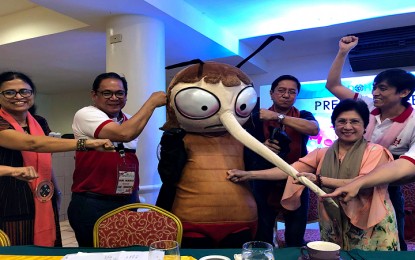
READY TO BEAT MALARIA: (From left) Dr. Gawrie Galappaththy, medical officer of World Health Organziation (WHO); Dr. Mario Baquilod, OIC regional director of Department of Health (DOH) Mimaropa Region; DOH USec. Gerardo Bayugo; Dr. Maria Francia Laxamana, assistant secretary of the DOH; and Rey Angluben, deputy program manager of the Pilipinas Shell Foundation, Inc. (PSFI)-Palawan pose with an Anopheles mosquito mascot to symbolize the determination to eliminate malaria by 2023. (Photo by Celeste Anna R. Formoso)
PUERTO PRINCESA CITY, Palawan -- The eradication of malaria in Palawan is crucial to the declaration of the Philippines as a “free zone” from the mosquito-borne disease, according to an official of the Department of Health (DOH).
In a media conference here Thursday, DOH Undersecretary Gerardo Bayugo said Palawan contributes 90 percent to the total number of malaria cases in the country.
“Very important ang papel ng Palawan in the eventual declaration of a malaria-free Philippines dahil halos 90 percent ng kaso ay dito nanggagaling. Halos ngayon, over 4,000 ng mga kaso ay from Palawan (Palawan is very important in the eventual declaration of the Philippines as malaria-free because more than 90 percent of the cases are from here. Right now, there are more than 4,000 cases in Palawan),” Bayugo said.
Data from DOH 4-B (Mimaropa) show that from January to November this year, an estimated 4,124 people caught the disease in Palawan, with one death recorded.
This is higher by 300 from the 3,824 who contracted malaria in the same period last year, although two deaths were recorded.
In Mimaropa, only Palawan and Occidental Mindoro remain with malaria prevalence.
In Palawan, the highest number of malaria cases was recorded in Rizal town with 2,718, followed by 374 in Bataraza, 329 in Balabac, 219 in Quezon, and 217 in Brooke’s Point, all in the southern area.
“Kung itong malaria ay mapagtutulungan natin ay mawawala – hindi man zero-zero dahil mahirap ang zero-zero cases – ay makakatulong na maabot natin ang ating target (If we all work together against malaria – not really a zero-zero case, because that is difficult to achieve – it can help us achieve our target),” Bayugo said.
He noted that if eradication is accomplished in the next four years, the Philippines has a chance of being declared malaria-free, not only in Asia but in the world.
Bayugo said Palawan’s malaria eradication program has gone a long way with the help of partners like Pilipinas Shell Foundation, Inc. (PSFI), and if efforts are further focused, “it is not going to be hard anymore to meet the target in Mimaropa.”
“Palawan’s role is very significant towards the eradication of malaria, and I hope local government officials would do their best to help in this,” he added.
Bayugo pointed out that in Palawan, malaria cases appear to have concentrated in upland areas where Indigenous Peoples (IPs) live.
He said these areas should be reached and the IPs should be assisted in following treatment against malaria to prevent deaths and recurrences.
DOH 4-B officer-in-charge, Director Mario Baquilod, said further that Palawan’s contribution to the total number of malaria cases in the country can go as high as 97 percent.
However, with efforts from all sectors, the province is already meeting its own target since the mosquito-borne disease is no longer in the urban areas of Puerto Princesa City.
“The goal of the national malaria program is that in five years, there should be no indigenous malaria cases. That is our main requirement. So in the case of Oriental Mindoro, we will already revalidate its zero case since 2012 to declare it malaria-free,” Baquilod said.
Meanwhile, the press conference was held following the holding of the 1st Regional and 10th Palawan Malaria Congress on Thursday, which was attended by more than 700 participants.
The congress was held in partnership with the Department of Education, World Health Organization, Act Malaria Foundation, Kilusan Ligtas Malaria, Research Institute for Tropical Medicine, the Palawan Provincial Health Office, City Health Office, and PSFI. (PNA)
